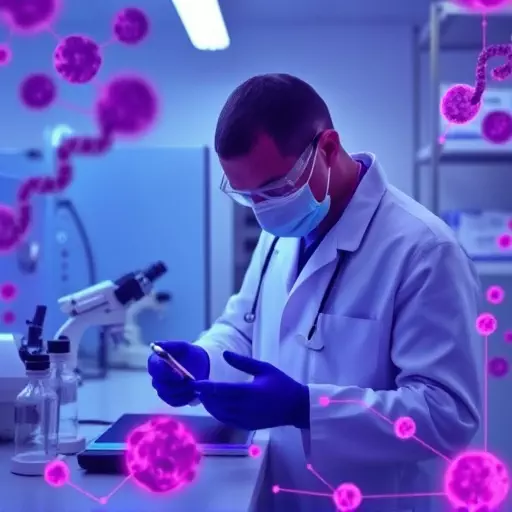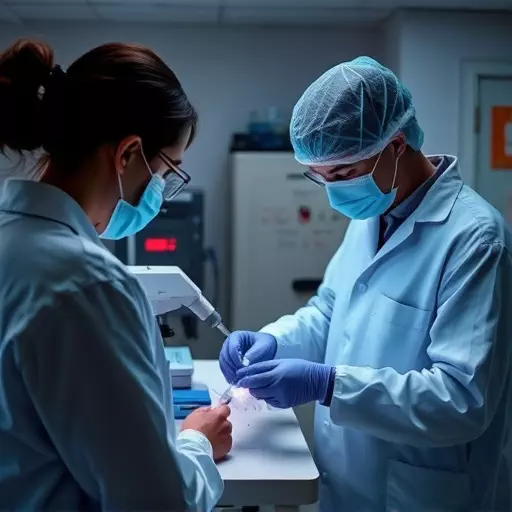In Toledo, advanced lab work combines tumor gene profiling and cytology to revolutionize hepatocellular carcinoma (HCC) treatment. Tumor gene profiling unmasks the genetic underpinnings of HCC, guiding targeted therapies effective against specific mutations. Cytology aids in early detection by analyzing cellular samples for precancerous changes, enhancing intervention before tumor progression. These precision-driven approaches, powered by lab work in Toledo, foster personalized medicine, improving patient outcomes by minimizing side effects and enhancing targeted therapy efficacy.
“Unraveling the mysteries of hepatocellular carcinoma (HCC) begins with a focus on its biomarker, alpha-fetoprotein (AFP). This article delves into the crucial aspects of testing AFP in HCC diagnosis and treatment. From understanding AFP as a powerful indicator to exploring advanced techniques like tumor gene profiling and cytology, we uncover how these methods enhance early detection and targeted therapies through the lens of innovative lab work in Toledo. Discover how each plays a synergistic role in revolutionizing cancer care.”
- Understanding Alpha-Fetoprotein: A Biomarker for Hepatocellular Carcinoma
- The Significance of Lab Work in Toledo: Unlocking Cancer Diagnosis
- Tumor Gene Profiling: Revolutionizing Targeted Cancer Therapy
- Cytology's Role: Detecting Precancerous Cells and Early Intervention
Understanding Alpha-Fetoprotein: A Biomarker for Hepatocellular Carcinoma

Alpha-fetoprotein (AFP) is a protein produced by the liver, and its presence or absence can provide valuable insights into a patient’s health, especially regarding hepatocellular carcinoma (HCC), the most common type of primary liver cancer. In the context of lab work in Toledo or anywhere else, AFP testing plays a significant role in early detection and diagnosis. Elevated levels of AFP are often an indicator of liver damage, inflammation, or even certain types of cancer, including HCC. This biomarker has proven to be crucial in monitoring treatment response and recurrence risk for patients with HCC.
The utility of AFP extends beyond its use as a standalone test. In the realm of targeted cancer therapy, integrating AFP into tumor gene profiling can enhance personalized medicine approaches. By analyzing AFP levels alongside genetic mutations and other biomarkers, healthcare professionals can tailor treatments to individual patients. Additionally, cytology techniques assist in detecting precancerous cells by examining cellular changes at the microscopic level, further contributing to early detection and improving patient outcomes.
The Significance of Lab Work in Toledo: Unlocking Cancer Diagnosis

In the intricate journey towards diagnosing and managing hepatocellular carcinoma (HCC), lab work plays a pivotal role, especially in Toledo’s medical landscape. Advanced laboratory techniques, such as tumor gene profiling, have emerged as powerful tools to unravel the genetic complexities of this aggressive cancer. By delving into the molecular intricacies of HCC, these methods enable doctors to tailor targeted cancer therapies, ensuring more effective treatment outcomes. This precision-driven approach is a game-changer in personalized medicine, where the unique genetic signature of each tumor guides therapy.
Cytology, another critical aspect of lab work, stands as a vigilant sentinel in the early detection of precancerous cells. Through meticulous examination of cell samples, cytologists can identify subtle changes indicative of malignancy, long before visible tumors form. This proactive approach enhances the chances of successful intervention and management of HCC, underscoring the significance of lab work in Toledo’s cancer diagnosis and treatment paradigm.
Tumor Gene Profiling: Revolutionizing Targeted Cancer Therapy

Tumor gene profiling is a powerful tool that has revolutionized the landscape of targeted cancer therapy. By delving into the genetic makeup of tumors, this advanced lab work in Toledo and beyond allows for a more precise understanding of the unique characteristics of each cancer. This approach is especially crucial when dealing with complex conditions like hepatocellular carcinoma (HCC). Through cytology, scientists and medical professionals can detect precancerous cells at an early stage, providing valuable insights into the tumor’s behavior and potential treatment options.
The role of tumor gene profiling extends beyond diagnosis; it guides patient-specific treatment strategies. By identifying specific genetic mutations or alterations, doctors can tailor targeted therapies that directly address these abnormalities. This personalized approach enhances the effectiveness of treatments, often with fewer side effects, as drugs are designed to interact specifically with the cancer cells while minimizing harm to healthy tissue. Such innovative lab work is a game-changer in the fight against cancer, promising better outcomes for patients.
Cytology's Role: Detecting Precancerous Cells and Early Intervention

In the fight against hepatocellular carcinoma (HCC), cytology plays a pivotal role as a powerful tool for early detection and intervention. Through meticulous examination, cytologists can uncover crucial clues about the presence of precancerous cells, enabling timely action to prevent the progression of this aggressive cancer. The process involves analyzing cellular samples from various sources, such as blood or liver biopsies, to identify abnormal cell behaviors that may indicate the onset of HCC. This early detection is particularly significant in regions like Toledo, where access to advanced lab work can significantly impact patient outcomes.
Cytology’s contribution extends beyond identifying malignancies; it also aids in understanding the complex landscape of tumor gene profiling. By studying the genetic makeup of cells, researchers can unearth specific mutations and alterations that drive cancer development. This knowledge is instrumental in tailoring targeted cancer therapies, where the focus shifts from broad-spectrum treatments to precise interventions aimed at the unique genetic signature of each patient’s tumor. Thus, cytology becomes a bridge between basic research and clinical practice, facilitating personalized medicine approaches in the fight against HCC.
